Imagine starting your life over in a place where everything is unfamiliar: the language, the culture, the city where you now live. You have no savings, no connections, no recognized credentials that will open doors. To support yourself and your family, you know you must find work, as soon as possible. This is the situation that refugees and other vulnerable newcomers to the U.S. face. People who come to the U.S. as refugees, with Special Immigrant Visas (SIVs), or humanitarian parole, are admitted legally. They are authorized and eager to work, in order to support their families and regain their independence. Nonetheless, finding suitable employment in an unfamiliar place can be difficult.
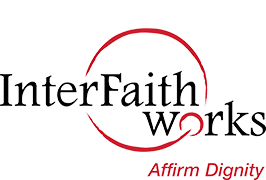 This is where organizations like InterFaith Works of Central New York (IFWCNY) step in to help. InterFaith Works, in Syracuse, New York, is one of EMM’s 15 affiliate partners. The employment services team at IFWCNY’s Center for New Americans provides vital support to clients, including training and help with recertification, as newcomers look for their first jobs in the U.S.
This is where organizations like InterFaith Works of Central New York (IFWCNY) step in to help. InterFaith Works, in Syracuse, New York, is one of EMM’s 15 affiliate partners. The employment services team at IFWCNY’s Center for New Americans provides vital support to clients, including training and help with recertification, as newcomers look for their first jobs in the U.S.
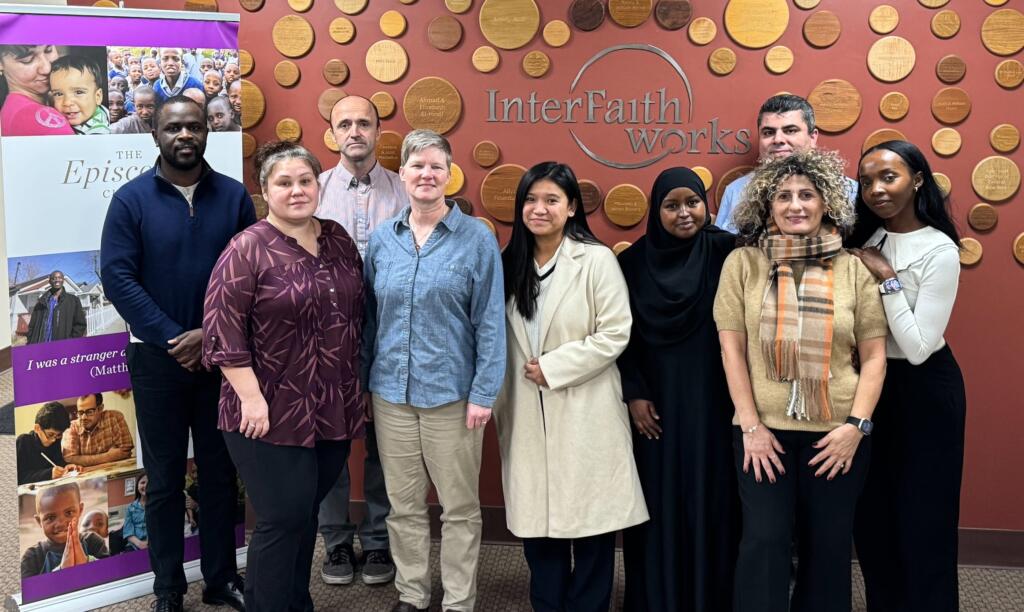
From left to right: Zachary Osolo, Alla Wescott, Sean Ferguson, Jen Lawrence, Oo Meh, Mariam Bile, Susu Moujabber, Ahmad Jakalan, and Mandy Alphonse constitute the employment services team at InterFaith Works’ Center for New Americans.
As Senior Manager of Employment Services, Jen Lawrence leads this team. She and her colleagues, many of whom are themselves New Americans, work together to provide a range of employment-related programs for newcomers. One of these, the Matching Grant (MG) program, is funded by the Office of Refugee Resettlement (ORR) in the federal Department of Health and Human Services. (It is called “Matching Grant” because of how it is funded: federal funds are available to local resettlement agencies who “match” those funds through financial and in-kind donations from private sources, such as local donors, community groups, and foundations.) The MG program is designed to help refugees and other ORR-eligible newcomers work towards economic self-sufficiency, by providing limited material assistance (towards rent, utilities, food) for up to 8 months, along with training and support in job readiness, financial literacy, and the process of applying for employment.
Challenges in achieving self-sufficiency
Syracuse is at the heart of a metropolitan area with a diverse economy. However, for refugees and other newcomers with limited incomes, there are two major barriers to self-sufficiency. One is that limited public transportation makes it hard to get to work, especially in a climate with inclement weather and harsh winters. Many workplaces that are willing to hire newcomers for entry-level positions – like warehouses and factories – are located outside of city centers and difficult to reach via public transportation. People living on limited incomes and earning low wages must often work for some time before they can buy a car and pay for insurance, gas, and maintenance costs. Reliance on public transportation constrains their options for employment in the meantime.
The other common barrier, as Jen Lawrence explains, is that many newcomers have a limited capacity in English when they arrive. Although they want to expand their mastery of English and often enroll in ESL classes, once they work full-time, it can be hard to keep up with classes. As a result, opportunities for employees with limited English to move into more rewarding positions may be rare. If what employees do at work does not help them become more conversant in English or acquire new credentials, this can also make it hard for them to advance beyond low-level jobs.
Support for newly arrived job seekers
InterFaith Works’ employment programs equip newcomers to succeed in the U.S. job market. Through job readiness training, participants learn job search strategies, resumé preparation, professional communication, and workplace expectations, including punctuality and reliability. Mock interviews and discussions on working conditions, benefits, and taxes further prepare them for employment.
For participants in the Matching Grant program, additional support includes a small monthly stipend to help cover the costs of rent, utilities, and food for their household, while they look for work, receive personalized budgeting assistance, and connect with community resources.
Additional training in workplace safety
In addition to job readiness, financial literacy and budgeting skills, refugees and other newcomers to the U.S. can benefit from other kinds of training. Workplace safety is a common concern across many of the environments where newcomer clients find entry-level jobs. In warehouses, assembly lines, construction sites, and elsewhere, employees may be expected to work with heavy machinery, drive forklifts, transport or lift items.
Jen Lawrence and her colleagues realized that if their clients already had basic workplace safety training that met standards set by the Occupational Safety and Health Administration (OSHA), it could help their job applications stand out in the eyes of potential employers.
Through their local network, InterFaith Works staff knew a certified OSHA trainer. After they reached out to her, the trainer agreed to offer a 10-hour workplace safety training for MG clients, volunteering her time and expertise as an in-kind donation. The first round enabled them to see how well this could work, especially if InterFaith Works could provide an interpreter and organize sessions for speakers of a common language. With an interpreter, twice as much time would be needed to complete the training, but clients would come away with a deeper understanding of how to keep themselves and others safe.
As Jen and her colleagues were figuring this out, EMM announced a new opportunity for affiliates to apply for small grants. These federal funds could be used in any number of ways to support client skills and integration through the MG program. InterFaith Works staff applied for and received a grant in July 2024. With this funding, they were then able to pay both the OSHA certified trainer and an interpreter to offer the workplace safety training for groups of clients who speak the same language.
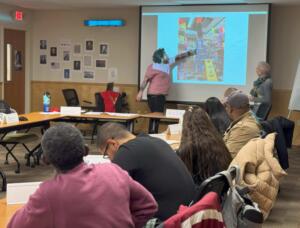
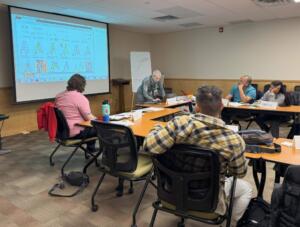
Trainers and participants in an OHSA training discuss safe ways to position and use ladders. Then they move from “theory” to practice, by taking turns putting on safety harnesses and dangling from a stand designed to show trainees how a harness will protect them in the event of falls.
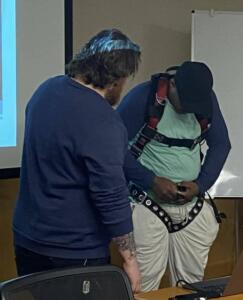
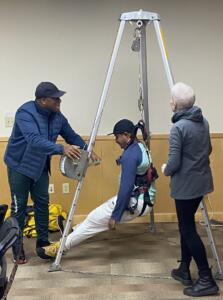
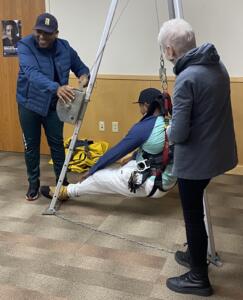
Eleven Spanish-speaking clients completed the OSHA training in fall 2024, and the employment services team is now organizing another round for clients who speak Dari, one of the main languages of Afghanistan. The construction industry in greater Syracuse is currently expanding and having OSHA training may give newcomer applicants a leg up in a sector with room for growth.
The grant that InterFaith Works received can also be used to cover the costs of recertification for MG participants who have professional or educational credentials from elsewhere. This too will increase their chances of finding work that uses their skills and enables them to become self-sufficient.
EMM is grateful to Jen Lawrence and the entire employment services team at InterFaith Works; to the community partners and interpreters who share their unique skills; and the Office of Refugee Resettlement, for making funds available for training and recertification. We also salute the intrepid newcomers who exemplify the resilience and adaptability that our society needs, now more than ever. Refugees come to the U.S. in search of safety and a new start. Helping them find work, hone their skills, and build community are fundamental steps to lasting integration that will enable all to thrive.



